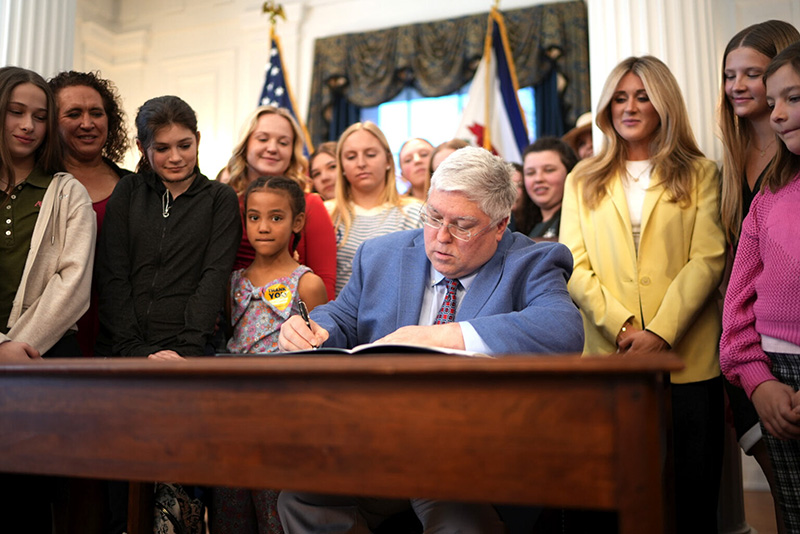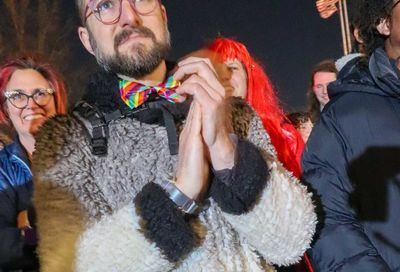The Riley Roundup: Cleveland Catholic Diocese’s LGBTQ Crackdown
Also, a D.C. gay man's death ruled accidental, and Missouri hospitals end trans youth treatments.

CLEVELAND DIOCESE REJECTS LGBTQ IDENTITY
The Catholic Diocese of Cleveland has issued new LGBTQ guidance expected to be implemented in its schools, discouraging students from any form of expression related to LGBTQ identity.
Under the guidance, all students attending Catholic schools under diocesan control are expected to act and dress according to standards based on their “God-given biological sex,” reports News 5 Cleveland.
This has raised questions about whether such a provision relies too heavily on gender stereotypes about clothing and behavior that could also impact non-LGBTQ students.
The policy prohibits students from transitioning genders or using gender-affirming pronouns, bars same-sex couples at school events, and prohibits students from “advocat[ing] or celebrat[ing]” the LGBTQ community, including displays of the Pride flag or rainbows.
A student’s biological sex will determine bathroom usage and membership on single-sex school-sponsored sports teams, although girls may join boys’ teams “when deemed appropriate.” Parents will also be notified if their child is believed to be gender-nonconforming.
The new policy has been criticized by some who have claimed it appears to conflict with more welcoming remarks by Pope Francis regarding the inclusion of members of the LGBTQ community within the Church.
The diocese has defended the policy as a request from church and school leaders, emphasizing the importance of training and education youth in Church teaching — even as it continues to claim that “each and every person is welcome and invited to be a part of the Church,” according to The Hill.
DignityUSA, a group for LGBTQ Catholics and their families, and the organization’s Northeast Ohio chapter, have said the diocese’s policy appears to “betray the essence of Catholicism.”
“The policies that our bishop has recently released send a clear message that welcome in our schools and churches is conditional,” Susan Russell, the President of Dignity Northeast Ohio, said in a statement. “They say people who are LGBTQ+ must hide the reality of who they are to be part of our faith communities or to learn at our schools.
“A majority of Catholics want our church to be fully welcoming of LGBTQ+ people. These are our siblings, our parents, our children, our friends, members of our faith communities. … This type of exclusionary policy wounds the Body of Christ.”
D.C. GAY MAN’S DEATH RULED ACCIDENTAL
A gay Black man who was found dead on a street in Washington, D.C., in May died of “acute ethanol intoxication.” The death has been ruled as accidental by city officials.
The Office of the Chief Medical Examiner for the District of Columbia reported that, in addition to being intoxicated, Ernest Terrell Newkirk also suffered from “hypertensive and atherosclerotic cardiovascular disease” — a heart condition associated with high blood pressure — and “end stage” kidney failure. The examiner claims the pre-existing conditions contributed to Newkirk’s death, according to NBC News.
The 55-year-old was a longtime resident who had previously worked as a chef for the Washington Wizards and owned a landscaping business. He was pronounced dead on May 28, hours after telling his partner, Roger Turpin, that he was driving home from a Black Pride event at the Ugly Mug bar in D.C.
He was found without his phone, wallet, or jewelry, and his car was recovered a week later, a mile away from where his body was found.
The circumstances surrounding Newkirk’s death led to speculation about the nature of his death, with some raising questions about whether he had been attacked, reported The Root.
Turpin told The Root that outgoing calls were made from Newkirk’s cell phone, Newkirk’s car received traffic tickets, and someone used his debit card to buy gas and attempted to use it at an ATM. Additionally, Turpin said that when Newkirk’s 2017 Camaro convertible was recovered, there were items in the car that belonged to neither him nor Newkirk. He alerted police, but said they dismissed the information he gave them.
The Metropolitan Police Department has confirmed an investigation into the death is ongoing.
An MPD spokesperson claimed, prior to the release of the medical examiner’s findings, that Newkirk’s death did “not appear to be a result of foul play,” noting the lack of trauma to the body. The spokesperson also defended the department’s investigation, saying it “approaches all cases with a profound sense of responsibility” and that “each investigation is given the utmost attention and dedication.”
MISSOURI HOSPITALS END TRANS YOUTH TREATMENTS
Two university-affiliated hospitals in Missouri have stopped providing certain types of gender-affirming care to transgender children due to a state ban on the practice — leaving even current patients who were exempt from the law in the lurch, reports Inside Higher Ed.
The Washington University Transgender Center at St. Louis Children’s Hospital announced on September 11 that it would stop prescribing “puberty blockers or cross-sex hormones to minors for purposes of gender transition,” saying it would refer current patients to other providers.
University of Missouri Health Care recently announced it would do the same, reports NBC affiliate KOMU. Both clinics will continue offering mental health services and limited health care that is not banned by the law, which was signed into law in June and went into effect on August 28.
Even though minors who were already receiving treatment are expressly exempt from the law’s provisions, both MU Health and WUTC declined to keep treating them over legal liability concerns, citing a provision in the law allowing people who receive treatment as minors to sue their former doctors for up to 15 years after they received care, or 15 years after they turn 21, whichever is later.
WUTC is facing a state investigation after a former employee claimed that the center had failed to inform patients of potential side effects of treatment, and alleged that doctors had rushed the process of starting minors on gender-affirming treatments without taking proper precautions.
An internal investigation by the center, as well as testimonials from former WUTC patients, disputed the claims.
Support Metro Weekly’s Journalism
These are challenging times for news organizations. And yet it’s crucial we stay active and provide vital resources and information to both our local readers and the world. So won’t you please take a moment and consider supporting Metro Weekly with a membership? For as little as $5 a month, you can help ensure Metro Weekly magazine and MetroWeekly.com remain free, viable resources as we provide the best, most diverse, culturally-resonant LGBTQ coverage in both the D.C. region and around the world. Memberships come with exclusive perks and discounts, your own personal digital delivery of each week’s magazine (and an archive), access to our Member's Lounge when it launches this fall, and exclusive members-only items like Metro Weekly Membership Mugs and Tote Bags! Check out all our membership levels here and please join us today!

























You must be logged in to post a comment.